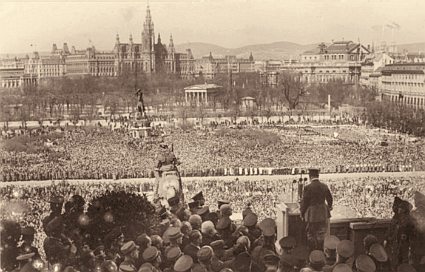Elisabeth asked me to spread this far and wide, this excerpt is part of that effort.
Also read: Sour Sound of Music: Vienna Philharmonic’s Nazi Past
The Vienna Philharmonic also had members of the SS, one of whom turned over more than a dozen orchestra members, at least five of whom perished in Nazi concentration camps. After the war, that Nazi official become the orchestra’s executive director. […]
In addition to orchestra members who had been low level members of the Nazi party, there were also SS – paramilitary – officials, including one trumpeter, Helmut Wobisch, who worked as a spy and who turned over more than a dozen orchestra members who were Jewish or married to Jews. At least five of those who had been turned over by Wobisch died in Nazi concentration camps.
Although Wobisch was removed from the orchestra in a “de-Nazification” effort after the war, he was welcomed back just two years later as lead trumpeter, and later served as the Philharmonic’s executive director between 1954 and 1968.
Lonely in the Classroom
This week marks a sobering anniversary for Austria: seventy-five years since the Anschluss of March 1938. The occasion prompted Elisabeth Sabaditsch-Wolff to express some thoughts about what happened back then, and the parallels with what is happening now across Europe and the entire Western world.

Lonely in the Classroom
by Elisabeth Sabaditsch-Wolff
This week we Austrians commemorate one of Austria’s darkest days: on March 12, 2013 we remember the 75th anniversary of the so-called Anschluss. Adolf Hitler’s triumphant return to his native country marked the end of Austria’s sovereignty and one of the culminating points of the rampant appeasement politics of the time — for which Neville Chamberlain was the premier example.
I am not going into the historical details, which may be found here. I will discuss the significance of the Heldenplatz, and the Hofburg surrounding the Heldenplatz. It was here, from that famous balcony, that Hitler delivered his famous speech, cheered by 200,000 Austrians, saying:
“The oldest eastern province of the German people shall be, from this point on, the newest bastion of the German Reich”[1] followed by his “greatest accomplishment” (completing the annexing of Austria to form a Greater German Reich) by saying“Als Führer und Kanzler der deutschen Nation und des Reiches melde ich vor der deutschen Geschichte nunmehr den Eintritt meiner Heimat in das Deutsche Reich.”Translation: “As leader and chancellor of the German nation and Reich I announce to German history now the entry of my homeland into the German Reich.”[2] Hitler later commented: “Certain foreign newspapers have said that we fell on Austria with brutal methods. I can only say: even in death they cannot stop lying. I have in the course of my political struggle won much love from my people, but when I crossed the former frontier (into Austria) there met me such a stream of love as I have never experienced. Not as tyrants have we come, but as liberators.”[3]
1 Liulevicius, Vejas Gabriel (2009). The German Myth of the East: 1800 to the Present. New York: Oxford University Press. p. 184. 2 “Video: Hitler proclaims Austria’s inclusion in the Reich (2 MB)” [mpg file]. Retrieved 2007-03-11. 3 Educational|accessdate=2007-03-11
As official Austria commemorates this terrible date by looking back and finally coming to grips with the fact that Austria was not just a victim, but that many — too many — Austrians marched alongside the “invading” army, we should never forget that those who do not learn from history are doomed to repeat it.
Learning from history does not only mean looking back, but also doing everything to prevent evil from happening again.
